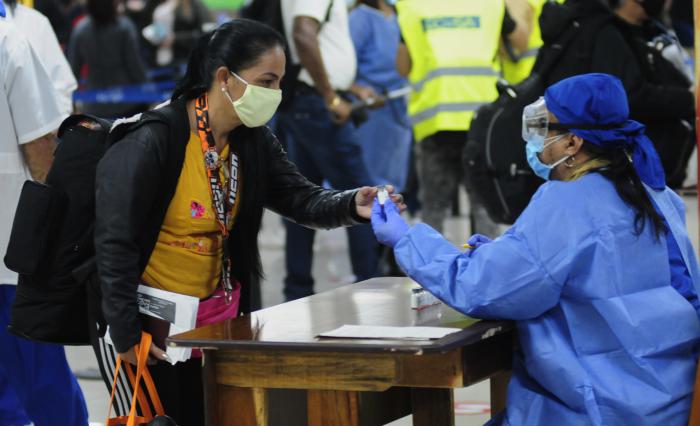On December 4 this year, the new rulings by the Ministry of Public Health related to the expansion of the world’s microns, the type of coronavirus that causes COVID-19, which has been identified as “of concern” by the World Health Organization (WHO). ).
The new strain is spreading rapidly, which is why Cuban health authorities have decided to implement new measures to strengthen control over international travelers.
Among the decisions that are starting to apply today, it is found that travelers from South Africa, Lesotho, Botswana, Zimbabwe, Mozambique, Namibia, Malawi and Eswatini (formerly Swaziland) must meet the following requirements at the point of entry:
- Complete vaccination schedule.
- Negative RT-PCR was performed at most 72 hours before the flight.
- A sample will be taken from RT-PCR to SARS-CoV-2.
- Compulsory quarantine will be applied to them for a period of seven days in a hotel designated for this purpose, provided that the traveler will bear the costs of accommodation and transportation.
- A new SARS-CoV-2 RT-PCR sample will be taken on day 6, and if negative, it will be taken out of quarantine on day 7.
In the case of travelers from Belgium, Israel, Hong Kong, Egypt, Turkey and the rest of Sub-Saharan Africa (Angola, Benin, Burkina Faso, Burundi, Cape Verde, Cameroon, Chad, Comoros, Ivory Coast, Eritrea, Ethiopia, Gabon, The Gambia, Ghana, Guinea, Guinea-Bissau, Equatorial Guinea, Kenya, Liberia, Madagascar, Mali, Mauritius, Mauritania, Niger, Nigeria, Central African Republic, Republic of the Congo, Democratic Republic of the Congo, Rwanda, Santo Tome and Principe, Senegal, Seychelles, Sierra Leone, Somalia, Sudan, South Sudan, Tanzania, Togo, Uganda, Djibouti and Zambia).
- The same procedures will be applied to them as in previous countries except for quarantine and RT-PCR on the sixth day.
“We have closely monitored reports regarding the behavior of the new Omicron variant. We are already designing specific vaccines. If necessary, we will develop it in a short time,” said Dr. Eduardo Martinez Diaz, President of BioCubaFarma, referring to what science is being done regarding the variant. The new SARS-COV-2 gene.
Knowing that achieving high levels of immunity against pathogens is essential for countries to confront potential variants of the Corona virus, Martinez Diaz recommended in another tweet that the most important thing at the moment is to continue the vaccination strategy, including the booster dose that has been applied since last November, in addition To maintain sanitary measures to prevent and control COVID-19.
Current knowledge about the omicron variant according to WHO/PAHO
In South Africa and around the world, researchers are conducting studies to better understand many aspects of the omicron variant and will continue to report their results as soon as they become available.
Transferability: It is not yet clear whether the omicron variant, relative to other variants, such as delta, is more transmissible (that is, if it spreads more easily from one person to another). The number of people who tested positive has increased in areas of Southern Africa affected by this variant, but epidemiological studies are being conducted to determine whether this increase is due to this variant or to other factors.
disease severity: It is still not known whether the clinical picture of infection with the omicron variant is more severe than that caused by other variants, including delta. According to preliminary data, hospitalization rates in South Africa are on the rise, but this may be because more people are becoming infected and not necessarily because they have the omicron variant. at present, There is no data to indicate that symptoms associated with this variant are different from those caused by other variants.
It is true that the first cases reported were of college students and that young adults tend to have a milder picture of the disease, but it will likely take days or weeks to learn the severity of symptoms caused by this variant. Since all types of the virus that causes COVID-19 – including delta, now prevalent worldwide – can cause severe symptoms and death, especially in the most vulnerable, prevention remains essential.
Preventive efficacy of previous SARS-CoV-2 infection
Preliminary data indicate that, compared to other variables of concern, The risk of reinfection with the omicron variant may be higher (i.e. people who have had COVID-19 before can get reinfected with this variant more easily). However, the information is still limited. We will have more information on this in the coming days and weeks.
Vaccine efficacy: The World Health Organization is working with its technical partners to understand the effects this formula may have on measures taken to combat the disease, including vaccines. Vaccination remains essential to reduce the frequency of severe diseases and deaths, even in the case of the delta variant which, for the time being, is dominant. All vaccines currently in use continue to prevent severe symptoms and death from COVID-19 very effectively.
Effectiveness of the current tests: Widely used polymerase chain reaction (PCR) tests continue to detect infection with various types of virus, including omicron. The efficacy with which other types of tests, especially those for rapid antigen detection, can detect this variant is being studied.
Effectiveness of current treatments: Corticosteroids and interleukin-6 receptor antagonists will continue to effectively treat severe cases of COVID-19, and it will be studied whether other treatments are still effective against the OMICRON variant, considering changes in different parts of its structure.
Studies are underway
The World Health Organization is coordinating a large number of researchers around the world to better understand the omicron variable. Studies to assess transmissibility, severity of infection (including symptoms), efficacy of vaccines, diagnostic tests, and treatments were or were soon to be conducted.
The World Health Organization encourages all countries to contribute to the collection and exchange of data on patients in hospitals through Global Clinical Data Platform – English, from the World Health Organization on this disease so that we can as soon as possible know the characteristics of the disease it causes and the clinical outcome of patients.
We will have more information in the coming weeks. The WHO Technical Advisory Group on the Evolution of SARS-CoV-2 will continue to collect and evaluate available data to see how omicron variant mutations alter the behavior of the virus.
Recommended actions for countries
Since the omicron variable is considered to be of concern, WHO recommends several measures for countries: increased surveillance and sequencing of samples from cases; exchange of genomic sequences in open databases, such as GISAID; Notify WHO of initial cases or clusters of cases; and conducting field studies and analytical evaluations to better understand whether the omicron variant has different characteristics in terms of its susceptibility to transmissibility and the disease it causes, or if it affects the effectiveness of vaccines, treatments, diagnostic tests, or measures. Social and public health. in a The statement was published on November 26 More information can be found in this regard.
Countries should continue to implement proven public health measures to generally reduce the spread of the virus that causes COVID-19, based on risk analysis and a scientific approach. In addition, they must increase their capacity to respond with both medical and public health resources to deal with potential increases in the number of cases. WHO continues to provide countries with support and guidance in both infection preparedness and response.
Similarly, reducing inequalities affecting access to COVID-19 vaccines is essential to ensure that the first and second doses of vaccines are administered in all countries to all vulnerable populations, including health care workers and the elderly, as well as equitably provided with tests Diagnostics and treatments they need.
Recommended measures for the population
The most effective measures a person can take to reduce the spread of the virus that causes COVID-19 are to stay at least one meter away from other people, wear an appropriate mask, open windows to ventilate rooms, avoid crowded or poorly ventilated places, keep hands clean, Cough and sneeze into a flexed elbow or into a tissue, and get vaccinated when it’s their turn.
WHO will continue to report on the conclusions of the meetings of the Technical Advisory Group on the Evolution of SARS-CoV-2 and other data that may be available. In addition, it will continue to post information on its online platforms and social media accounts.
Reference material:
Classification of an omicron variant (B.1.1.529) from SARS-CoV-2 as a variant of concern.
More information in English on the Technical Advisory Group on the Evolution of SARS-CoV-2.

“Unapologetic tv specialist. Hardcore zombie trailblazer. Infuriatingly humble problem solver.”

/cloudfront-eu-central-1.images.arcpublishing.com/prisa/BSZTSRM7BBEGRMTSM6DTRYGISU.jpg)
/cloudfront-eu-central-1.images.arcpublishing.com/prisa/WP2YZTBU4JBXDG3CKVEPKBNAE4.jpg)




More Stories
Haitians struggle to survive amid gang violence in the capital
Ecuadorians cast their votes in a referendum on anti-crime laws – DW – 04/21/2024
Everything is ready for popular consultation in Ecuador